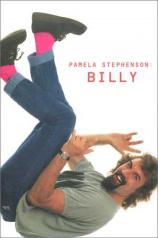Billy
Review
Billy
Scottish comedian Billy Connolly is hugely popular in the U.K. He
sells out venues usually played by rock stars and rates splashy
national television specials.
But don't feel bad if you can't quite picture who he is. Despite
touring in the U.S., appearing often as a guest on American
television shows, and playing character roles in a string of
movies, Connolly hasn't cracked the ranks of top comedians on this
side of the Atlantic. He may be most recognizable to U.S. audiences
for his one-year run on the late '80s sitcom "Head of the
Class."
And that's a problem for BILLY, the biography written by his wife,
Pamela Stephenson. While the writing is solid, even at times
graceful and insightful, this is primarily a book for Connolly fans
hungering after a peek into the comedian's psyche. In the U.K.,
Connolly's popularity has already made BILLY one of the
biggest-selling books of the year. But the biography may hold
meager appeal for non-fans.
To be sure, Connolly's life story is dramatic. He spent his first
few years in a cramped Glasgow tenement with his mother and
slightly older sister. At the age of four he was abandoned by his
mother and flung into the care of a violent, sadistic aunt. His
father returned from the war, but was as unsuited to child
nurturing as the other adults in the young boy's life. What little
attention Connolly got from his father came in the dark, in the
sofa bed they shared.
"Late one night, when Billy was ten, he woke to find his father
'interfering' with him, as he puts it," Stephenson writes. "Then,
and for the next four or five years, his father's frequent sexual
abuse was a mystery to him, like being in an accident."
Stephenson, a former comedian turned clinical psychologist, returns
often to the obvious connection between Connolly's harrowing
childhood and the angry energy infusing his humor. It's not a bad
point. It's just that the story of childhood hurt reaping comic
genius has lost its intrigue through too many tellings. Show us a
brilliant, edgy comedian raised in a happy family --- now that
would be news.
That heard-it-all-before feeling intensifies as the book progresses
to Connolly's adulthood. Talent, ambition, and pure creative joy
propel him forward, but not fast enough to elude the insecurities
that torture him. A first marriage turns ugly. He soaks his pain in
copious amounts of alcohol. The drinking causes more pain. The love
of a good, strong woman helps him stop drinking and subdue, if not
banish, his demons. He marries the woman and becomes a devoted
father. He achieves domestic tranquility, and more career
success.
Add a manager who steals his money and you've got an episode of
VH1's "Behind the Music."
The book also suffers from two unfortunate tendencies in
Stephenson's writing. The first is her incessant name-dropping. One
anecdote in the book seems to function solely as an excuse to cram
the names Kevin Spacey, Geena Davis, Freddie Mercury, Bill Maher
and Patrick Stewart into the space of a single page.
Stephenson compounds the first bad tendency with the habit of
enthusing over how much famous people admire her husband's work.
This passage, describing a day of filming on Robert Redford's movie
Indecent Proposal, is typical: "When Billy performed his bit part
as the auctioneer, he improvised to keep the audience interested
through the many takes. One of the retakes occurred because Redford
had failed to leave the scene as early as he should have. 'But it
was so funny!' he protested. 'I didn't want to stop listening to
Billy!"
Three paragraphs later, Stephenson reveals that David Hockney
sometimes phoned to ask her and Connolly to come by the studio to
see his just completed paintings before the rest of the public. A
few sentences later, the reader is treated to this encounter with
Frank Zappa's widow: "After Frank died, Billy was walking the dogs
past Frank's house when Mrs. Zappa came out. 'Are you Billy
Connolly,' she asked. 'Frank was your biggest fan.'"
For readers who aren't already Connolly fans, the book would have
been more compelling if Stephenson had managed to adopt less
gushing tone. Stephenson too often comes across as a combination
groupie/doting wife. Connolly fans --- on both sides of the ocean
--- tend to be an ardent bunch, so they're likely not to mind the
fawning.
Reviewed by Karen Jenkins Holt on January 21, 2011
Billy
- Publication Date: September 11, 2002
- Genres: Biography, Nonfiction
- Hardcover: 304 pages
- Publisher: Overlook Hardcover
- ISBN-10: 1585673080
- ISBN-13: 9781585673087



